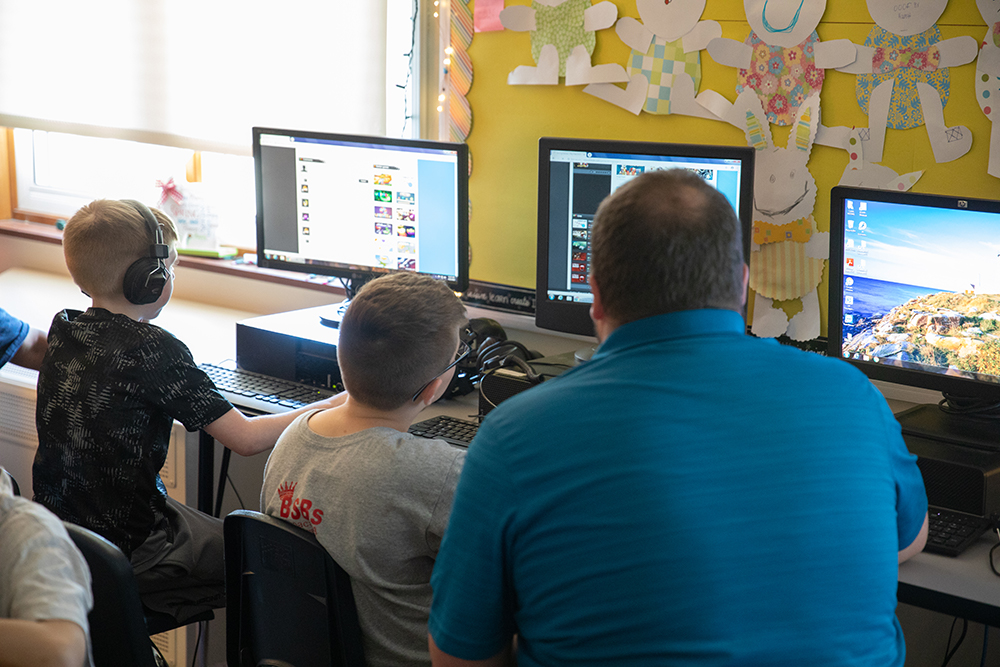Learning at Bradley

Education with Standards and Structure
The Bradley School is a licensed, private academic school for elementary and secondary students. All Bradley School academic programs are operated according to the regulations established by the Pennsylvania Department of Education (PDE) with regard to special education.
All Bradley teachers are certified by PDE, and our structured classrooms are supported by highly-qualified teachers’ assistants, Master’s level therapists, and a certified principal and special education supervisor.
Small Class Sizes = Big Leaps in Improvement
Each classroom is licensed as emotional support serving a maximum of 12 students with a licensed special education teacher and a teaching assistant. For example, our special education classes typically have a ratio of 1 adult for every 6 students, and our autism-focused classrooms have an adult-to-student ratio of 1 to 4. These smaller class sizes maximize the individual interaction between teachers and students, which ensures Bradley students are receiving the personal attention they need to succeed.
Individualized Education Plans (IEPs)
Students at The Bradley School learn through highly individualized education plans (IEPs) to help them achieve their full potential academically, socially, and emotionally. This is achieved through the use of the Sanctuary Model®, SOAR (Safe, On-Task, Accountable, Respectful) Behavior Modeling, and the School-Wide Positive Behavior Support Program. Each student’s behavioral progression is evaluated daily, and their IEP and curriculum goals are reassessed on a weekly basis to determine whether a student is making progress or whether new adjustments to the plan need to be made.
Academic Social Learning
School counselors are available to provide individual and group couseling as designated in the student’s IEP. Counselors assist with transition back to public school as well as preparation for after high school.
Food Service
Students at The Bradley School are served a breakfast and a healthy lunch each day, provided in accordance with The National School Lunch Program.
Technology + Training = Opportunity
Students’ attention, focus, and behavioral and academic skills are enhanced within The Bradley School’s well-structured and technology-enhanced classrooms.
All classrooms are equipped with interactive Promethean boards. Students also have access to Chromebooks and iPads as well as a fully-equipped computer lab for additional research and skill remediation using online programs.
Interventions and Supports
- Cognitive Behavior Intervention for Trauma in School (CBITS) — Through a screening process, students are invited to participate in the CBITS prescriptive group during the school day
- Character Education — Students participate in daily social emotional learning exercises and activities within the classroom community
- Community Based Instruction — With partnering businesses and organizations, students are able to participate in workforce development training and independent skills development at several community-based sites
- Group Social Skills Instruction — Students participate in daily social skills instruction with the classroom community to develop interpersonal relationship skills
- Independent Living Skills Instruction — During the school day, independent living skills instruction development is directly addressed through formal instruction, and is also incorporated into the classroom curriculum
- Individual and Whole Group Incentives — Reinforcement for prosocial behavior and academic progress is delivered on an individual basis, as well as in a whole group setting
- Individual Counseling— Students have opportunities for regular individual counseling sessions with a Master’s level clinician, as determined by the IEP team
- PBIS – Positive Behavioral Interventions and Supports (PBIS) is an evidence-based, tiered framework for supporting students’ behavioral, academic, social, emotional, and mental health.
- Peer Mediation — Facilitated by school staff, students who experience interpersonal relationship challenges can participate in sessions to resolve differences with their peers
- Peer Mentoring — Younger students are assigned an older student as a peer mentor to model and reinforce appropriate prosocial skills
- Pet Therapy — Classroom pets and therapy dogs certified through Animal Friends provide opportunities for students to practice care, compassion, and empathy
- Sanctuary – As a trauma informed school community, the seven sanctuary commitments (Nonviolence, Emotional intelligence, Social Learning, Shared Governance, Open Communication, Social Responsibility, Growth and Change) are integrated into our daily practice.
- Service Learning — Students participate in various volunteer activities in the community and at The Bradley Center to generalize learned social skills
- Supported Employment/Work Release — In coordination with the IEP team, students are able to participate in work release during the school day, with the employer and the school monitoring and assisting with IEP/Transition goals
- Therapeutic Crisis Intervention (TCI) — TCI is used to pro-actively prevent and/or reduce potential crisis situations with students. May include implementation of passive physical restraints in times of unsafe behavior

